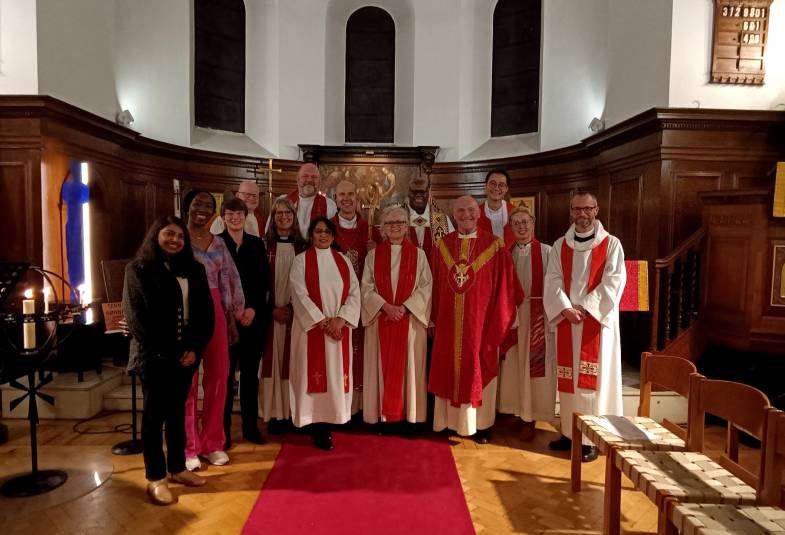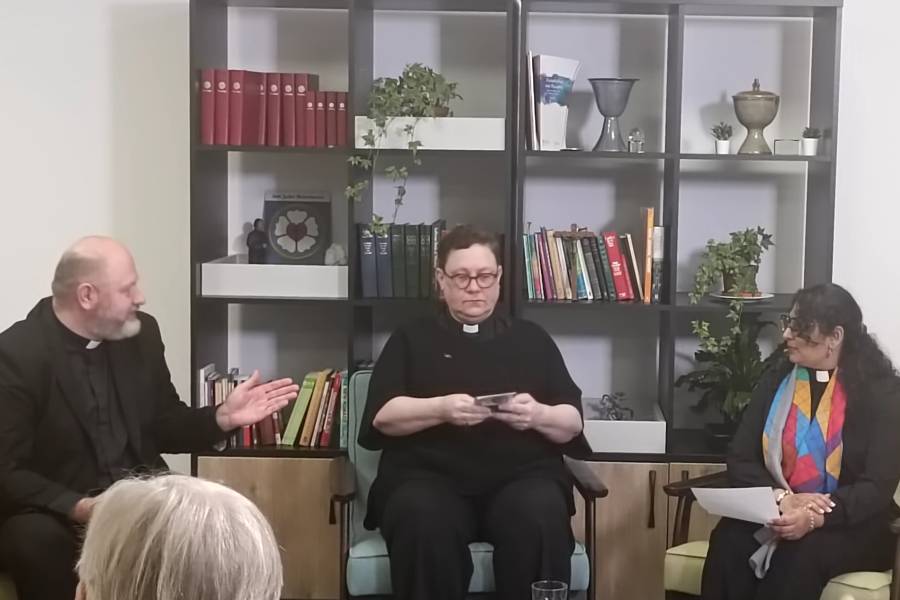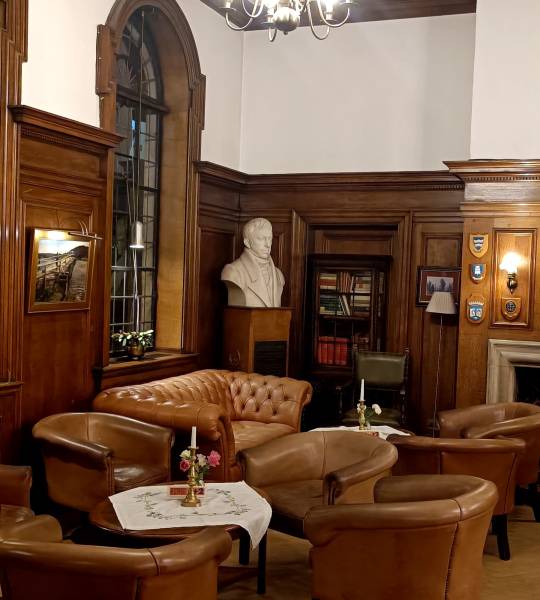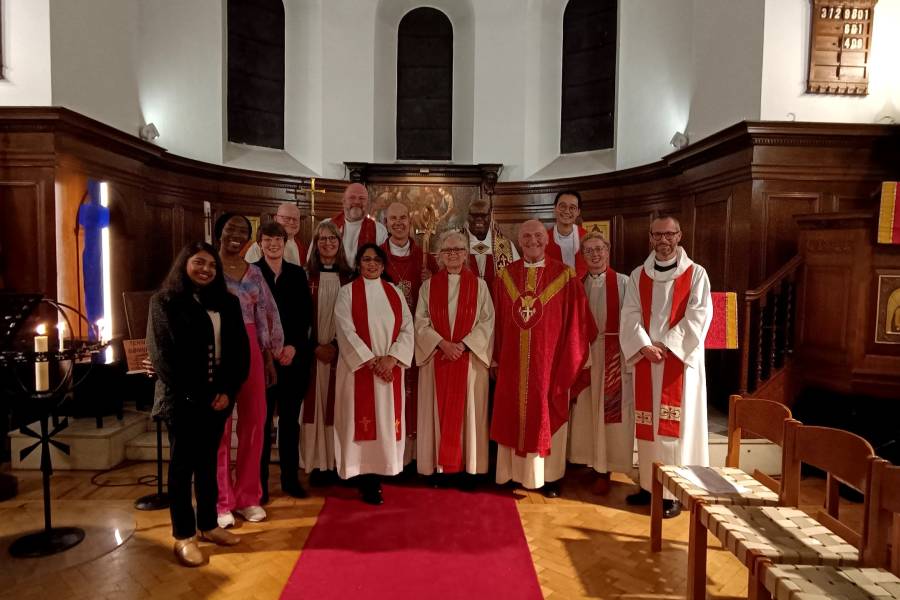31/10/2023
This year, the Council of Lutheran Churches (CLC), formerly known as the Lutheran Council of Great Britain, is celebrating its 75th Anniversary. The festive day was Reformation Day on the 31st of October, commencing at the CLC office at 11 am, featuring reflections on the past, insights into the present, and glimpses into the future. The day culminated with a Reformation Day service at 6 pm at the Norwegian Church.

Sermon for Reformation Day 2023
by Dr Anna Krauß, General Secretary of the Council of Lutheran Churches
75 years is not a very long period of time in the history of the Church (with a capital C). Neither is it a very long period of time in the history of Lutherans living and worshipping in this country. And yet, we dare to celebrate and joyfully so– not just for celebration’s sake, but because we celebrate the people who, through their dedicated effort, have built up the Lutheran Council of Great Britain over the decades, and because we want to give thanks to God who has sustained the work of the Council and its people in in all those years.
It is of course not an arbitrary choice to have this celebration on Reformation Day. The actual ‘birthday’ of the Council, if you like, was on 18th March 1948, but what unites the very diverse churches under the Council’s umbrella is a Lutheran identity. That can mean different things to different people, but Reformation Day is of course a day that encourages us to reflect on what it means to be Lutheran both internally and in relation to other churches around us. It is wonderful therefore, that we are able to celebrate together with ecumenical guests. To be Lutheran is to be ecumenical.
And what a set of readings we have to reflect on Lutheran identity. The passage from Romans 3 is filled with buzzwords of Lutheran theology: the law and how it relates to the Gospel of salvation; justification, righteousness, faith, works and how these are related to one another in Christ. If you want to delve really deeply into Lutheran thinking, you can even find a couple of genitive constructions that need a decision on whether this is a genitive of the object or the subject.
Rich pickings for a sermon on this day – and of course absolutely no pressure on the preacher…
The reading from Romans doesn’t stand in isolation, however. In all of the three readings, we hear about something that hasn’t or doesn’t work in building a relationship between God and humans. So, God radically changes the status quo so that we are able to be in a relationship with God.
In the reading from Jeremiah, the covenant that was broken will be replaced with a covenant that cannot be broken. In the reading from Romans, the law is not the way to salvation because we cannot fulfil it. This is important because it does let us recognise our sinfulness and need for salvation. But the path to salvation itself lies not in the law, it lies in Christ. In the reading from John, the slavery to sin is replaced by freedom in Christ.
It is important to understand that God is the source of these fundamental and utterly radical changes, even though we are the ones who need them. You may know that the Lutheran doctrine on justification teaches that we are utterly unable to create righteousness before God by ourselves. We are merely the receivers of righteousness, as if a cloak of righteousness has been put around us, covering our sin, but is and remains something external, a gift given to us. It is God who, in Christ, enables us to a life with God. This is a covenant that cannot be broken, salvation that cannot be argued by law and a freedom that cannot be taken away from us.
To say it using the metaphor from the Gospel of John: God is the one who holds the household together, it isn’t us and not even our faith. This is why Christians dare to hope even when the circumstances they encounter are hopeless. Because the source of their hope is the one who holds the household together.
The Council was founded because displaced Lutherans and their pastors found themselves in refugee camps here in the UK, scattered and isolated. It was the plight of those refugee communities, the need to support them pastorally and the wish to connect isolated pastors that drove the Lutheran World Federation and the Lutheran Church Missouri Synod to collect money in support of the Lutheran communities and the newly formed Council. The first ten years of the Council are the only period in the history in which all Lutheran churches in this country were united under one umbrella, a unity we have now lost.
It is by no means the only organisation that was established uniting different parties in the immediate aftermath of World War Two. The Lutheran World Federation was founded in 1947 in a period when, I quote from the website: ‘Lutheran churches aspired for greater fellowship and solidarity among themselves’. Humanitarian aid was and remains one of LWFs pillars.
The United Nations were established in 1945 to provide collective security, bringing together the Soviet Union, China, the United States of America, the United Kingdom and many other nations. Could you imagine something like this happening today?
Humanity had just emerged from an atrocious war. It had just learned about the horrors of the Holocaust. More people than ever before were displaced during the war and in the following years. Many European Lutherans fled to the UK from countries under Soviet occupation. One commentator in a book detailing the first 25 years of the Council describes this period as one of ‘great confusion’. And yet, those people dared to hope. The Council’s main aim as described in its Articles of Association is ‘the advancement of the Christian Religion by bearing united witness before the World to the Gospel of Jesus Christ as the power of God for salvation.’ It is this faith in the God of salvation, this hope, that underpins the work of the Council to this day.
The world in which we find ourselves today is very different from that 75 years ago. But humanity today, too, faces challenges of enormous proportions which have devastating consequences: The climate catastrophe, already destroying lives and livelihoods, the fight for justice of so many different groups of people that have been and still are pushed to the margins of society and are facing discrimination, the rise of populism and extremism, wars and waves of refugees in urgent need of support. I am sure we can all think of many more examples.
I said at the beginning that we dare to celebrate, and we dare to celebrate with joy because we can look back with thankful hearts, thankful for the work of those who have come before us and for God’s gracious guidance. But we can also dare to look ahead and, despite the challenges we are facing as a society today, we can look ahead with hope. This is not a simplistic hope that says: ‘Don’t worry, everything will be fine.’ It is founded in the faith that God is holding our household together. Even when the world is void of hope, this is why we dare to hope.
Amen.






